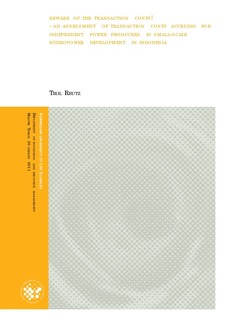| dc.description.abstract | High transaction costs (TC), perceived or real, can have severe consequences for real life economic outcomes. For private investors, too high perceived transaction costs can lead to the exclusion of profitable investment alternatives. Possible reasons why such potentially profitable investments are excluded are that the real TC level is lower than assumed, or that the TCs are inadequately mapped, and could have been reduced if they had been identified and targeted. Too low budgeted TC, or not accounting for TC at all, can on the other hand lead to unexpected cost overruns and failed investments.
The core argument of this thesis is that where a large share of total project costs are not production costs, high TC occur and will affect economic outcomes. Where extensive TC occur, reductions potentials are large. A prerequisite for managing TC is to identify them. When known, more of the TC can be taken out of risk premiums incorporated in higher discount rates and required rates of return, and treated as explicit cost variables.
My aim is to shed light on the importance of treating TC beyond theoretical discussions. There does not yet, exist a commonly accepted definition of TC, nor a coherent methodology in how to incorporate TC in economic analysis. The theoretical framework applied in this thesis has taken form while trying to combine existing TC literature into a unified framework for treating TC more directly. The theoretical framework has been used to assess the particular TC accruing for foreign independent power producers in the Indonesian small-scale hydropower sector. The inherent context-dependency of TC make case studies like this important to reveal more about the causes and extent of TC. The emphasis will however be on findings that have relevance for TC and economic results more generally, and address the real-life consequences for small-scale renewable energy development in particular.
My findings support existing literature indicating that “extensive” TC often accrue for small scale investment projects in developing countries. In the hydropower case investigated in this thesis, I also found indications that the most extensive TC stem from costs associated with delayed project operation. Moreover, TC appears close to fixed. TC will therefore place a comparatively larger burden on small-scale hydropower projects, compared to larger projects in Indonesia.
Where extensive TC accrue, effective management of these costs can be used as a comparative advantage, possibly so influential that it explains the difference between the projects that realize profits, as in the case investigated, and the ones that fail. | no_NO |
